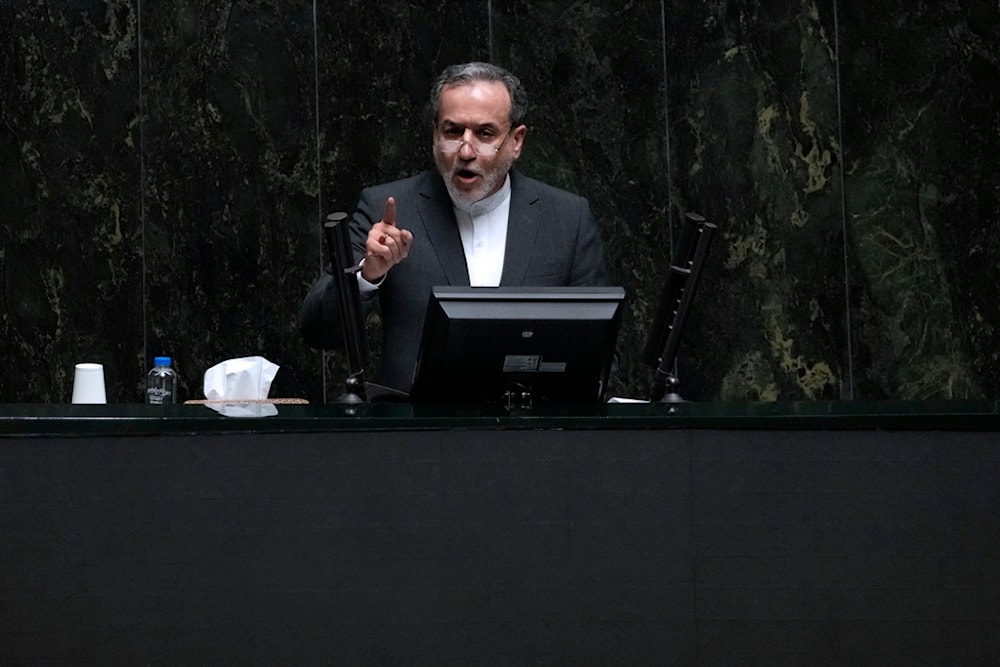Assassination of Nilforushan will not go unanswered: Iran
General Abbas Nilforushan, the Deputy Commander for Operations of the Islamic Revolution Guard Corps (IRGC), was killed in an Israeli attack on Beirut.
-

Nominee for foreign minister Abbas Araghchi speaks in an open session of parliament during the second day of debate on the 19 proposed ministers by Iranian President Masoud Pezeshkian in Tehran, Iran, Sunday, Aug. 18, 2024. (AP Photo/Vahid Salemi)
Iranian Foreign Minister Abbas Araghchi has pledged that "Israel's" killing of Brigadier General Abbas Nilforushan, the IRGC's Deputy Commander for Operations, will not go unpunished.
According to an IRGC statement released on Sunday, General Nilforushan was killed in an Israeli bombing in Beirut on Friday, along with Hezbollah's leader, martyr Sayyed Hassan Nasrallah.
In a letter to IRGC Chief Commander Major General Hossein Salami, Araghchi stressed that "this vicious and cowardly act is another clear sign of the terrorist and criminal nature of the Zionist regime and its well-known supporters."
"Without a doubt, this horrible crime of the aggressor Zionist regime will not go unanswered," he declared, vowing that Iran's diplomatic apparatus will utilize all of its political, diplomatic, judicial, and international powers to pursue "the criminals and their supporters."
He also expressed his sympathies to Leader of the Islamic Revolution's Leader Sayyed Ali Khamenei, General Salami, and the Iranian people on the martyrdom of General Nilforushan.
Araghchi noted that the martyr had a remarkable record of true endeavors during the Iran-Iraq war, as well as assisting the resistance front against terrorism and Zionism.
Who was Abbas Nilforushan?
Born in 1966 in Isfahan, Iran, General Nilforushan was a distinguished military leader within the IRGC, serving as the Deputy Commander for Operations. His military career began in 1980 when he joined the Basij Organization, a volunteer paramilitary group that serves conjointly with the IRGC, before formally entering the ranks of the IRGC.
His involvement in the Iran-Iraq War (1980-1988), known as the Sacred Defense in Iran, shaped much of his military philosophy and career.
During the Iran-Iraq War, Nilforushan, despite his young age, served on both the western and southern fronts, leading several critical military operations. His courage and effectiveness during the war saw him garnering rapid promotions within the IRGC, becoming one of Iran's most respected military strategists.
Following the war, Nilforushan pursued academic studies in strategic management, earning a Ph.D. from Iran's Imam Hussein University. From 2005 to 2007, he held the position of Deputy Commander for Operations within the IRGC Ground Force.
He later commanded the IRGC Command and Staff College from 2010-2014, where he played a crucial role in training future Iranian military leaders.
In June 2019, he was appointed to the position he would later be martyred under, Deputy Commander for Operations at the order of IRGC Commander-in-Chief Major General Hossein Salami, further solidifying his role as a key figure in the military leadership of Iran.
General Nilforushan's legacy extends far beyond his military role within Iran. He was a vital figure in coordinating efforts across the Axis of Resistance, which includes Hezbollah in Lebanon and various Palestinian Resistance factions. Through his efforts, the groups expanded their influence and military capabilities, even in the face of sustained threats from the Israeli occupation and its allies.
Known for his commitment to the Islamic Revolution's ideals, Nilforushan championed the rights of the oppressed in the region, particularly focusing on supporting the Palestinian and Lebanese causes. His strategic vision helped unite resistance groups across different territories, enhancing their ability to combat the occupation and global oppression.
His role in planning and supporting operations across the region made him a central figure in the anti-Zionist, anti-Western Resistance network. As a military commander and a strategic thinker, he was instrumental in forging stronger ties between Iran, Hezbollah, and Palestinian factions, creating a unified front in the face of the Israeli occupation.

 4 Min Read
4 Min Read








